By now, it’s crystal clear that the Coronavirus pandemic has fundamentally changed the business world across the board.
Many companies have had to shut down indefinitely—and some even permanently.
Even those that have managed to stay operational are facing a ton of uncertainty as they try to keep things moving in the right direction.
For these companies, there are only two options:
Adapt, survive, and potentially thrive
Fall far behind those who have figured out how to navigate these uncertain waters
The unfortunate truth is that many companies seem to be taking the latter route—especially when it comes to PPC advertising. Case in point, recent reports show that Facebook and Google stand to lose over $44 billion in ad revenue due to the global shutdown.
While this situation isn’t ideal for anyone, the silver lining is that those who adjust their PPC strategies appropriately are all but guaranteed to come out of it in pretty good shape.
Here, I’ll dig into the many ways you can adjust your approach to better serve your target audience during these trying times.
Note: If you are want to see your Google Ads keywords from your leads, sign up for Leadfeeder's 14-day free trial.
PPC? Really? During a global pandemic?
Alright…
You’re probably thinking I’m crazy to suggest that PPC campaigns are the way to go given the current state of the world.
And, generally speaking, you have a point.
I mean, take a look at this graph showing the difference between average and actual click-through performance for Google Ads.
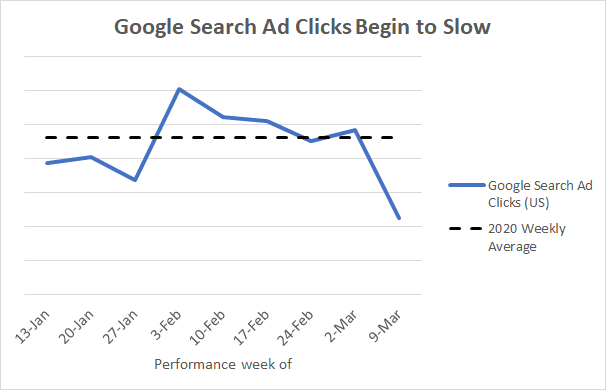
Conversion rates have also dropped by an average of 21 percent since COVID-19 began to spread in the US.
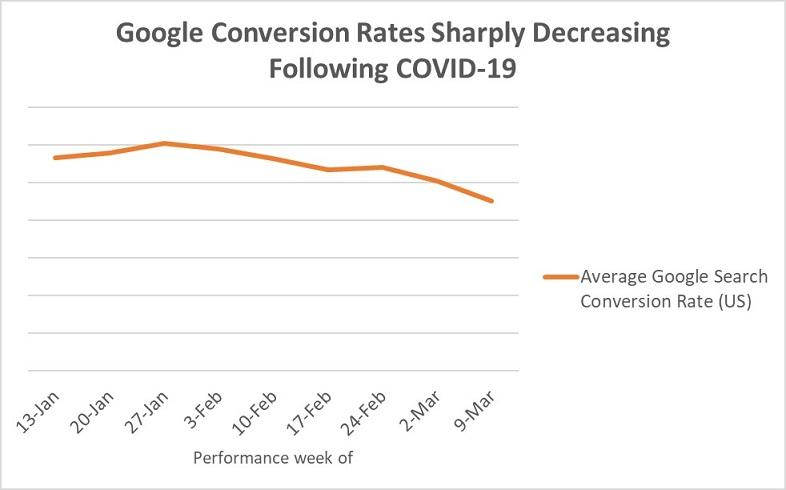
Again, I get it.
From a bird’ s-eye view, it looks like no one is buying anything right now (and rightfully so, as they have much more pressing matters to attend to).
So, it may seem like a complete waste of time and money to keep your PPC campaigns up and running. After all, you’re probably scaling back on as many expenses as you can, right?
Before you jump to either of these conclusions, though, it’s important to take a closer look at the facts.
Regarding the general drop in PPC performance, much of it is concentrated in specific industries. The travel industry, for example, has been one of the hardest hit by the Coronavirus outbreak.
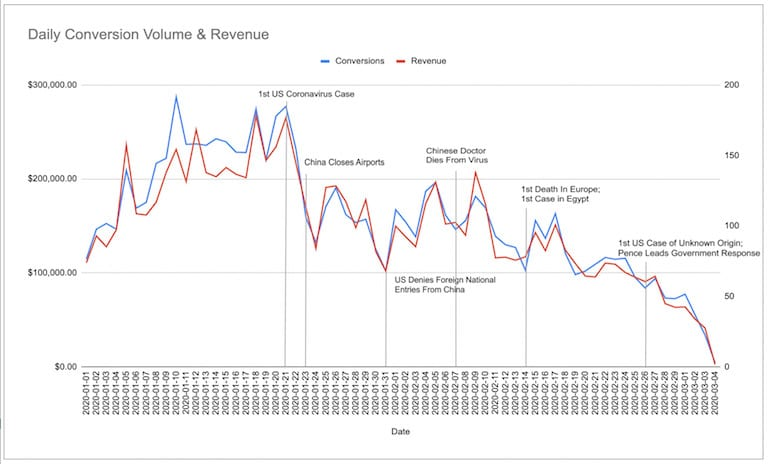
The same can be said for restaurants, bars, and other businesses in the hospitality/entertainment/recreation industries.

But, many other industries are actually thriving in terms of their PPC performance.
As Wordstream’s data shows, on-demand/virtual entertainment companies are seeing an increase in search ad conversions of up to 102 percent.
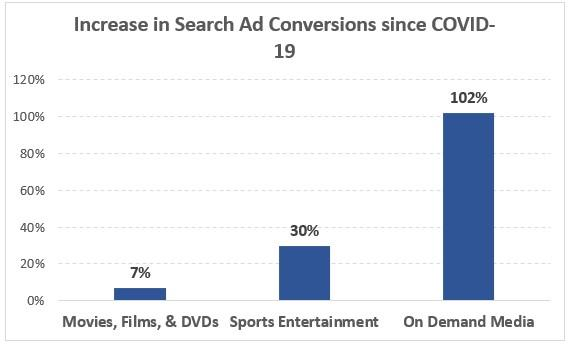
In the B2B realm, office supply companies and packaging services are also experiencing gains in terms of PPC performance.
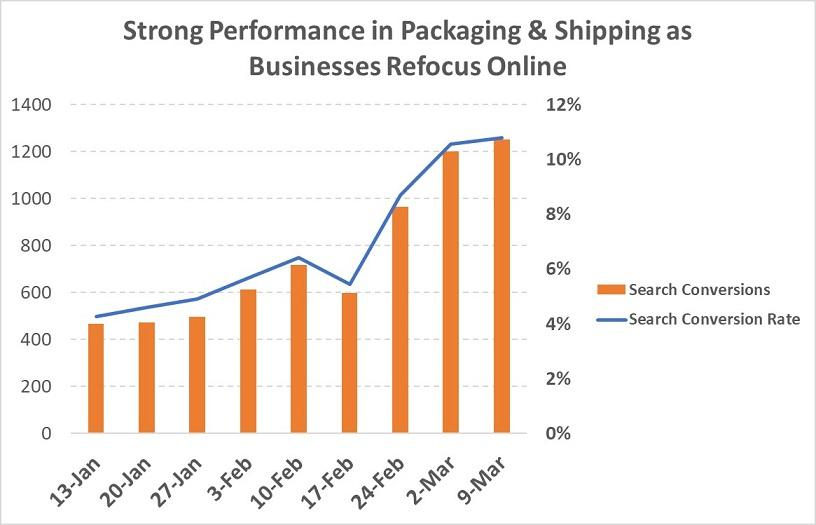
And, of course, brands offering medical and health products/services are definitely thriving at the present moment.
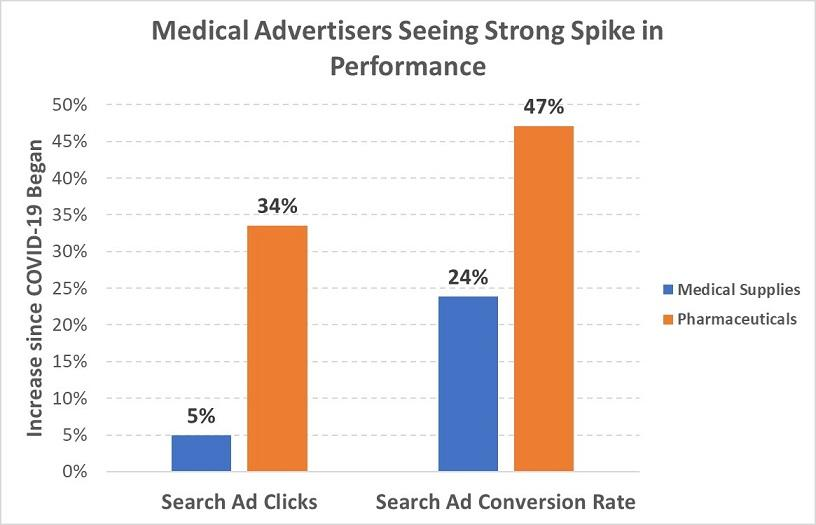
In looking at the general assumption that many (if not most) companies are scaling back their PPC spend, well.
If most other companies in your industry are doing so, this is all the more reason for you not to. Not only will you have less competition, but you also won’t need to spend as much to gain the visibility you’re looking for.
What’s more, remaining visible during these uncertain times can add to your brand’s credibility and reliability in the eyes of your target audience—both now and once things get back to “normal.”
Of course, this doesn’t mean you should just stay “business as usual” with your PPC campaigns.
Rather, you’ll need to tweak—and potentially overhaul—your approach in order to experience continued growth throughout the shutdown.
Let’s take a look at how to do just that.
General PPC tips for all industries during the COVID-19 shutdown
Before getting into more industry- and situation-specific PPC tips, let’s discuss some essential adjustments all companies should be making during the Coronavirus shutdown.
Tip #1: Take immediate action—and react quickly
During “normal” times, PPC best practices dictate that you dig deep into as much data as you can find so you can be all but certain your next campaign will succeed.
But, of course, this is uncharted territory for everyone—and the only certainty is uncertainty. Absolutely no one knows for sure what will and won’t work with regard to PPC campaigns right now.
The only ones who will figure it out are those who take their best-educated guess and immediately put their campaigns into action.
Think of it this way.
If you don’t try, you’ll never figure it out—and will fall even further behind your competitors
If you try and fall short, you’ll at least have a better idea of how to adjust your approach moving forward
If you try and succeed...well, kudos!
Now, as far as collecting performance data goes, you don’t have much time to spare. With things changing as rapidly as they are, you need to use whatever data you have to make agile decisions regarding your PPC campaigns.
Your goal should be to get ultra-granular here, assessing your campaign performance by the hour and day.
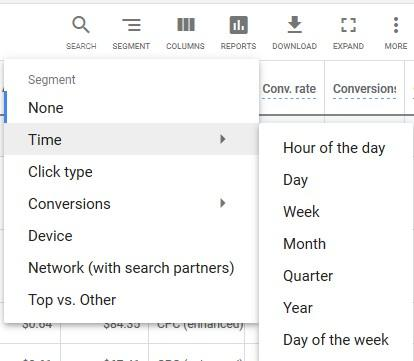
While this relatively small amount of data is obviously not ideal, it beats having no data at all—and may actually give you more insight into PPC and search trends than you’d initially think.
More than just looking at your campaign performance data, you also want to keep your finger on the pulse of your industry and the world at large.
Google has recently developed a section of Trends specifically aimed at helping us all keep track of Coronavirus-related searches (and compare these trends to non-COVID search terms).
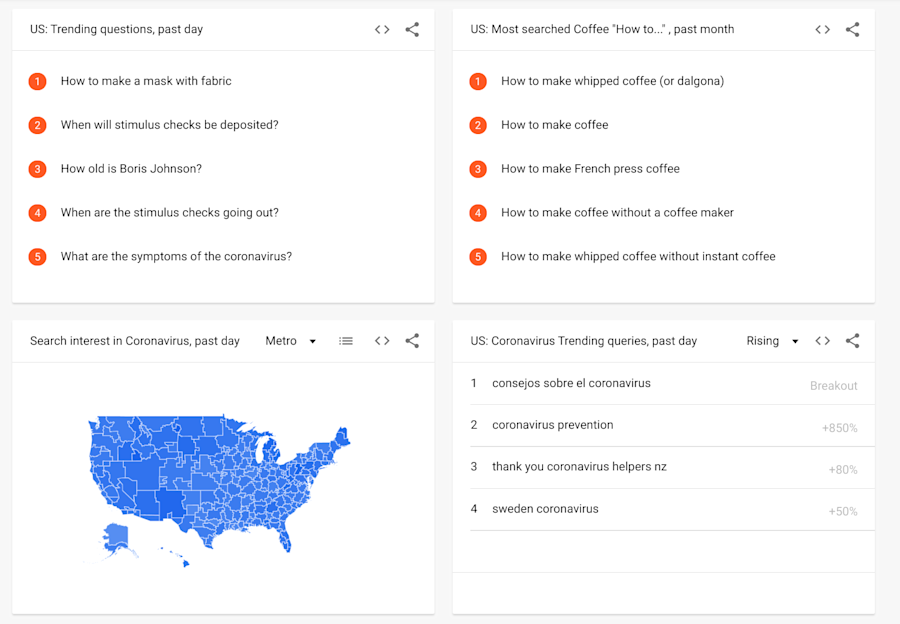
While the hope, of course, is for COVID-related searches (and COVID itself) to dissipate, it’s important to recognize just how much the virus is dominating search altogether.
This will allow you to quickly capitalize on major opportunities once the virus starts dying down, and things start getting back to normal.
(And, for the time being, it will allow you to put your PPC performance into perspective. While you’ll obviously be hoping for the best, the truth is none of us can expect to outperform COVID-related searches at the moment.)
Tip #2: Refine your messaging—but tread carefully
This goes for your PPC ads and any other content you create throughout the current pandemic:
Your messaging must be sensitive and empathetic to both your target audience and the world as a whole.
Failure to heed this advice—even semi-unintentionally—is guaranteed to lead to the backlash:
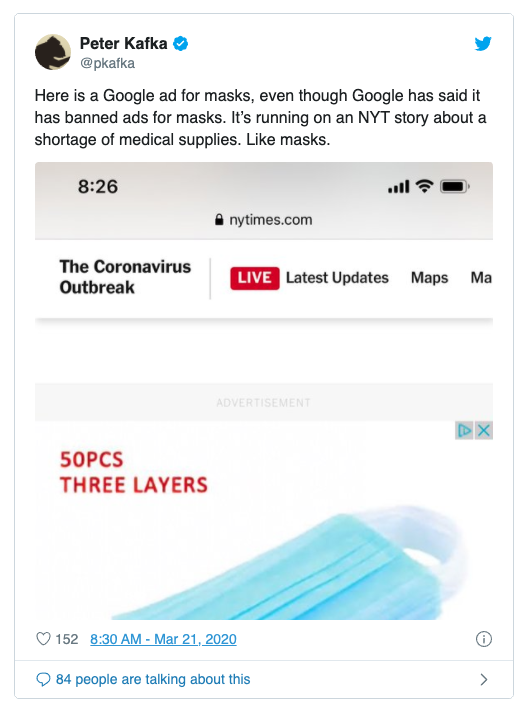
Or, your ad might not even be approved in the first place. To be sure, this might actually do less damage than if you were to offend your audience—but it still won’t do much good for your company.
At any rate, what you do want to do here is create ads that showcase the value of your product or service given the circumstances your audience is currently in.
As many brands have done, this likely means focusing on how your brand fits into your audience’s temporary way of life.

(Note: Direct selling may or may not be appropriate or effective right now. Again, tread carefully; if you are going to continue selling via PPC ads, make sure to sweeten the deal as much as possible. More on this in a bit.)
This may also be a time to revisit your brand’s value proposition altogether.
If you can get to the heart of what your products or services actually bring to your customers’ lives—both during this crisis and otherwise—you’ll stand a much better chance of surviving and thriving in the future.
Tip #3: Cut wasted ad spend
During normal times, it can be easy to keep average-performing campaigns live as long as they’re bringing in some kind of value.
But this simply cannot be your approach right now.
Instead, now’s the time to pause (and even dump) campaigns that haven’t been doing well anyway. Chances are if they weren’t moving the needle all that much before, they’re not going to be helping all that much at the present moment.
(And, of course, you can then reinvest the money you’ll be saving into your other, higher-performing campaigns).
As mentioned earlier, you’ll also want to keep close tabs on the campaigns that are still bringing value to your business. This means implementing dayparting strategies, adjusting your bids based on the time of day your audience is most active.
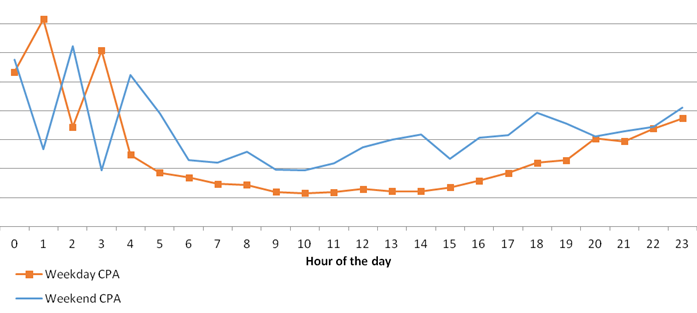
It’s also important to add COVID-related search terms to your list of negative keywords.
This will prevent your ads from showing up for search terms that are seemingly related “on paper,” but really have nothing to do with your products or services.
Even during times of crisis, the old adage “you gotta spend money to make money” holds true in the PPC world. Like I said earlier, merely pausing your campaigns altogether just isn’t the way to go.
But, there’s a massive difference between just throwing money at your campaigns and figuring out the most efficient way to keep them running.
While you should always be looking to be more cost-effective with your approach to PPC, it’s perhaps more important than ever to take this advice to heart.
The future of your business depends on it.
PPC tips for industries that have slowed down
If business has essentially grinded to a halt for your company, you may be hesitant to run any PPC campaigns at all.
But, to be blunt:
That approach will only lead to stagnation.
Though your business may not be in an ideal situation, you can still make the most of it in a couple of ways.
Tip #1: Forge and build relationships with your audience
Okay.
If your target audience isn’t in “buying mode” right now—either by choice or by necessity—then there’s very little point in trying to sell to them.
But, you can still engage with them and nurture the relationship without focusing on leading them through the sales funnel.
Instead, your focus should be on figuring out what their current (and future) priorities are—and determining how your brand fits into the mix.
For example, Canva developed a section of its website dedicated to multimedia messages aimed at spreading awareness of COVID-related information.
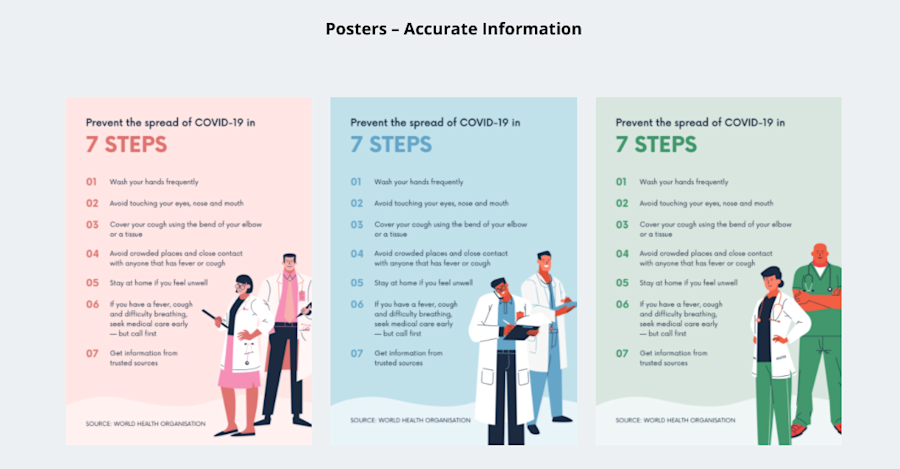
In addition, Canva is also using its platform to send messages of hope to anyone in need of a pick-me-up during these difficult times.
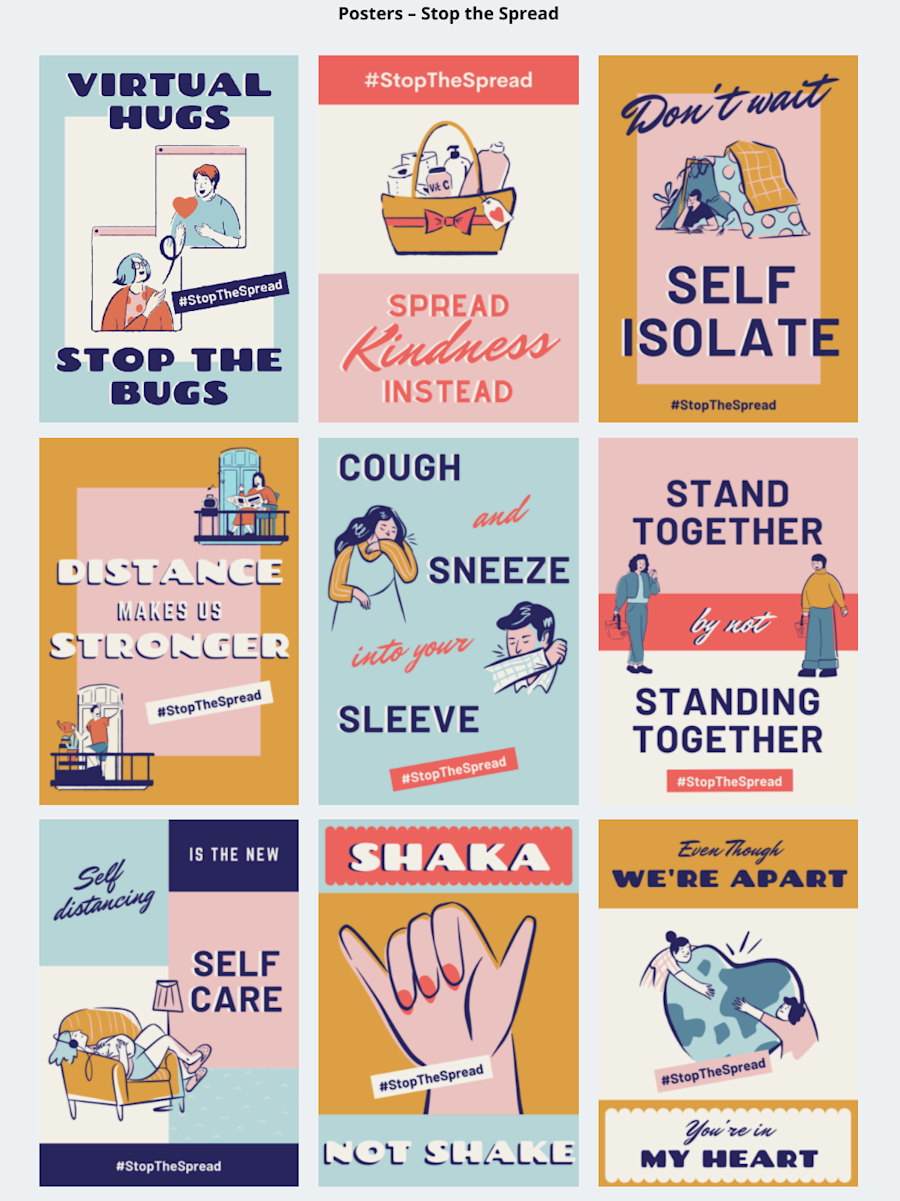
If you’re offering similar products or services without any sales strings attached, this should be the focus of your PPC ads for the present moment.
Depending on your approach, you might choose to gate your content or services behind a mailing list form in order to get your audience “officially” engaged with your brand.
You can also use Leadfeeder to track your audience’s on-site behavior and piece together their needs accordingly.
Your goal here is to generate brand awareness and make clear to your new audience that you’re in business to serve them—not to make sales.
If you can build trust in your new audience from the get-go—without asking anything in return—you’ll have little trouble converting them into paying customers when the time is right.
Tip #2: Pile on the added value
Now, just because you shouldn’t be pushing sales on your target audience doesn’t mean you should ignore sales opportunities when they arise.
So, if your target audience does show signs of intent to purchase, you certainly want to make it easy for them to do so.
Moreover, once they make the first move, you want to give them much more than they expected.
A few examples.
Adding in additional premium features at no extra cost
Offering a refund if their company goes out of business due to Coronavirus
Adding in additional training to help them get the most out of the product
Providing an additional free month to annual subscriptions
How do you know if a consumer is still in buying mode?
The same ways you’d identify high-intent buyers during normal times:
Their behavior as they engage with your brand.
Whether they’re checking out certain products on your site, adding items to their cart, or even abandoning purchases at the last minute, these are all clear indicators that they’re at least thinking of buying from you.
From there, it’s a matter of retargeting them with laser-focused PPC ads that pile on the value.
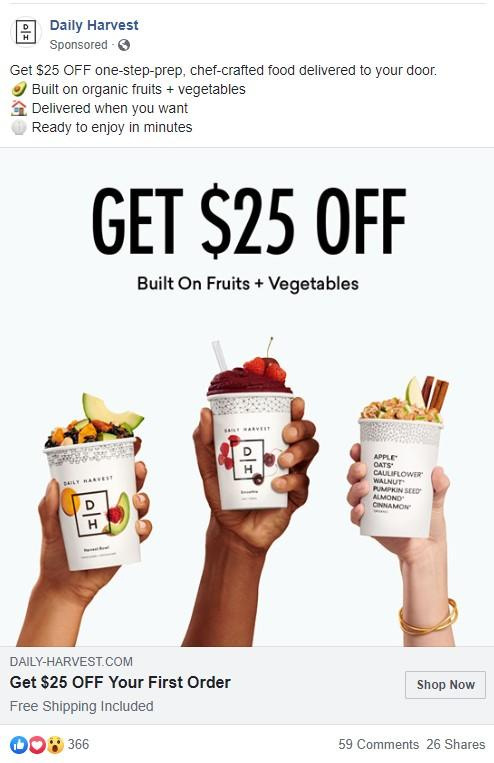
Again, though.
Tread carefully in terms of being too salesy—and definitely avoid blatantly taking advantage of the current situation. That said, if it’s obvious an individual wants to buy from you...well, you have every reason to let them do so.
PPC tips for industries that are still booming
On the other side of the spectrum are the industries that are actually thriving through the COVID shutdown.
Still, it’d be a mistake for companies in these niches to just continue on as if nothing has happened.
Instead, these companies need to start ramping up their approach to PPC campaigns.
Here’s how they can make it happen.
Tip #1: Focus on ROI and ROAS over CPA
Even if your business has seemingly weathered the COVID-related storm, your goal shouldn’t just be to stay afloat.
Instead, it should be about generating as much value from your still-active customers as possible.
(While, of course, doubling down on the value you provide them in turn.)
If you’re still focused on cost per acquisition or cost per conversion, you’re in the wrong mindset.
You’re focused on keeping costs down while making as many sales as possible—under the assumption that sales could dry up at any moment.
While that sounds all well and good, it’s pretty short-sighted.
As you surely know, acquiring a single new customer or making a single extra sale doesn’t mean you’re generating more value over time.
Instead, you should be focused on converting high-quality leads and high-LTV customers—knowing that they’ll continue to provide more value to your business in the long run.
The key metrics to focus on, then, are return on investment, and return on ad spend.
Obviously, this workflow is meant for when things are operating as usual.
For the time being, immediate action is key.
Using what you know—and what you quickly learn as you get your PPC campaigns live—make educated guesses as to which personas or segments will be most active during the shutdown.
From there, it’s again a matter of creating highly-targeted ads that fit the immediate needs of these customers—and that gets them to quickly take action (i.e., make high-value purchases).
Tip #2: Increase ad spend when competition is dropping out
This is more to reiterate the message from earlier—but it’s definitely worth repeating.
If your competitors are decreasing their bidding expenses, or are entirely dropping out of the PPC game altogether, for the time being, you absolutely should be taking advantage of it.
This is especially true if your competitors are dropping out because of incorrect assumptions regarding their audience’s purchasing intent.
If your competitors think your audience isn’t buying, but you know they are, you’re quickly going to be able to capitalize on any opportunities that arise—while your competitors are hunkering down, waiting out a storm that doesn’t actually exist.
Wrapping up
The PPC industry as a whole has changed entirely in the last few weeks. Little of what we considered certainties only a few short weeks ago remain so today, and PPC is no different.
But, if companies can adapt during these uncertain times and continue to grow, it will give employees some sense of security in a very uncertain world.
It’s likely that you have already come under pressure to reduce spend or, at the very least to justify the expense. This is only a natural and sensible reaction given the circumstances, but is it the only option and is the right one?
The answers to these questions depend a lot on each individual company’s situation, but in this post, we hope to give you the framework on how to make these tough decisions and how to best adapt these challenging times.
Note: If you are want to see your Google Ads keywords from your leads, sign up for Leadfeeder's 14-day free trial.
Now that you're here
Leadfeeder is a tool that shows you companies that visit your website. Leadfeeder generates new leads, offers insight on your customers and can help you increase your marketing ROI.
If you liked this blog post, you'll probably love Leadfeeder, too.
Sign up

![How to Keep Calm & Create A Pipeline During COVID-19 [Webinar Recap]](http://images.ctfassets.net/plii0v5gbc4s/PMKzLjKllGhfTMhotAfbO/433c75d1e9cea0c049b88b911538bef9/coroanvirus-sales-pipeline-header.png?w=686&q=80)
![Tearing up the Playbook: How Leadfeeder Marketing Has Adapted to the New Normal [Webinar Recap]](http://images.ctfassets.net/plii0v5gbc4s/3k8aqcXigWZmuihXHBrjJ8/a9e1caa3b66f1ad49d6267bcbe94829e/marketing-coronavirus.png?w=686&q=80)




